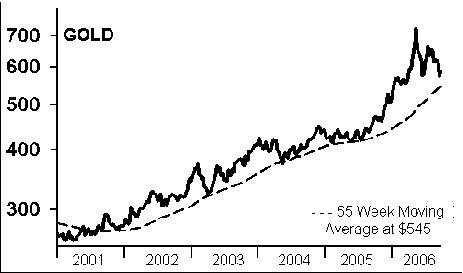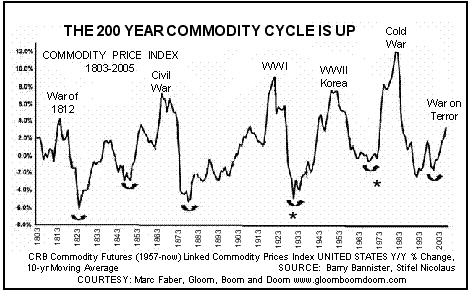Get the latest financial news, insights and expert analysis from our award-winning MoneyWeek team, to help you understand what really matters when it comes to your finances.
You are now subscribed
Your newsletter sign-up was successful
Want to add more newsletters?

Twice daily
MoneyWeek
Get the latest financial news, insights and expert analysis from our award-winning MoneyWeek team, to help you understand what really matters when it comes to your finances.

Four times a week
Look After My Bills
Sign up to our free money-saving newsletter, filled with the latest news and expert advice to help you find the best tips and deals for managing your bills. Start saving today!
Gold fell sharply this month. This has disappointed many investors. In fact, many are saying the bull market is over and the days of booming price rises has ended, but the facts indicate otherwise.
Gold's bull market remains in force and that'll continue as long as gold stays above $545. What we've seen so far is a strong downward correction within the bull market, which is not unusual considering gold rose 72% from July, 2005 to May, 2006 (see chart below). This recent action, however, is providing a good opportunity to stand back and review some important investment fundamentals.
First, it's important to recognize that markets have a life of their own. Sometimes they'll do things that are unexpected or unreasonable and sometimes they're dull, but that's okay. It's really all part of it.
MoneyWeek
Subscribe to MoneyWeek today and get your first six magazine issues absolutely FREE

Sign up to Money Morning
Don't miss the latest investment and personal finances news, market analysis, plus money-saving tips with our free twice-daily newsletter
Don't miss the latest investment and personal finances news, market analysis, plus money-saving tips with our free twice-daily newsletter

Chart 1: Gold price, 2001-2006
Investing in gold: look at the long-term trends
Our focus is on the bigger picture and the major trends. As we've found through experience, it's far more profitable to invest with the major trends and then stay with them for as long as they last. That's how you'll make the best profits over time as opposed to short-term trading.
Even though we try to identify when a market is likely to rise or decline within its major trend, we don't recommend trading corrections unless you're a trader and willing to take unnecessary risks. The main problem with trading is that you could get left behind once the major trend gets going again, and we've seen this happen time and time again.
It's far better to take a position and basically relax, knowing the major trend is up and it's going your way. If that market turns down for a month or so, don't panic and sell. We know that's difficult sometimes but as you know, no market ever goes straight up or straight down. Up and down movements are normal.
If you find yourself excessively nervous, then you probably have too much of your investment funds in that particular market. In that case, sell down to a point where you'll feel more comfortable. We also advise keeping a 25% trailing stop on your long-term positions in case a market does dramatically turn down because that'll help limit your losses.
Don't concentrate on daily fluctuations
We keep daily charts in our office, but we like weekly charts much better because they provide more insight into what's happening as far as the major trends go. That's why most of our charts are based on Friday weekly closes. This strips out the daily fluctuations, so if daily market swings tend to raise your blood pressure, then step back and focus on the weekly charts.
This strategy has worked well over the years and it's resulted in double digit profits in 18 out of the past 21 years. We know markets can be volatile, but we truly believe that if you follow these simple rules you'll be pleased with the long-term results.
For younger readers we can only say, if you try to make a killing wheeling and dealing, you'll probably get creamed. Remember, something like 90% of all traders eventually end up losing money. As we learned in our early days when we watched our $2000 savings soar to $75,000 in the interest rate futures market, only to see it come crashing back down again don't waste your time being one of the 90%.
The commodities mega-trend
Again, stay focused on the major trends. These usually last for years and they're the most important. Also important are the even bigger mega trends, which tend to last for decades. On Chart 2 you'll see the index for commodity prices going back to 1803 and the mega trends since then. Note that these trends don't change often, but when they do they last for a long time.

Chart 2: The 200 year commodity cycle
Since 1803, for instance, there have only been five mega upmoves in commodity prices, lasting about 22 years on average. The sixth mega upmove is just beginning and it's coinciding with the war on terror, just as previous upmoves also coincided with wars.
This tells us that the current rise in commodities, gold and oil could last for another 15 years or so. But that doesn't mean they'll go straight up. There might even be a year or two of a decline during this upward path but if that happens, our major trend indicators will identify this so we can protect ourselves accordingly.
Currently, for instance, the economy is slowing. Consumer confidence is down and the leading economic indicator has been down for months. Since this index leads the economy by nine months, it's signaling the economy will remain weak into 2007. Durable goods orders are also down and inflation is slowing. Consumers are feeling the pinch and adjustable rate mortgage delinquencies have soared 140% this year. The housing market is becoming worrisome and this too is going to hurt the economy.
Investing in gold: macroeconomic factors
If the economy slows too fast or goes into recession, it'll likely put further downward pressure on commodities and gold. This is something we're watching closely, but if it does we believe it'll be a temporary slowdown within the major and mega uptrends.
Looking at the bigger picture, U.S. total debt obligations now range between $44 to $79 trillion. Bush has said the war on terror will continue for years, which guarantees even more debt. This means that inflation is an absolute necessity as it'll help erode this gigantic debt load. And ongoing inflation will keep upward pressure on this commodity mega uptrend in the years ahead.
Enjoying this article? For two recommended articles like this every day, plus the latest investment news and opinion from MoneyWeek, sign up to our FREE daily email, Money Morning. CLICK HERE
The same is true of geopolitical factors. Oil, for example, is essential for the world economies and oil sources are unstable as big producers bask in the power oil has given them. We all know what's happening in Iran and this will continue to be a sore spot, keeping upward pressure on oil.
To a lesser degree, the same is true of Venezuela's Chavez. Venezuela is one of the biggest oil suppliers to the U.S., if not the biggest, and Chavez has threatened to cut the U.S. off. He stands by Iran and Cuba, he's bought an enormous amount of military equipment from Russia, calls Bush names, and he's made a deal worth billions to sell oil to China.
China has also made a huge deal for Russian oil, as it's doing with so many other countries. In order to fuel its booming economy, China is looking ahead and obtaining oil and natural resources from around the world. China's growth has been one of the main factors driving commodities higher and as China continues to grow in the upcoming years, this alone could be the primary factor propelling this mega commodity trend higher.
The main point is, be on the right side of the major and mega trends. So far it's been profitable and we expect that'll continue, so stay with it.
Mary Anne & Pamela Aden are well known analysts and editors of The Aden Forecast, a market newsletter providing specific forecasts and recommendations on gold, stocks, interest rates and the other major markets. For more information, go to www.adenforecast.com
Get the latest financial news, insights and expert analysis from our award-winning MoneyWeek team, to help you understand what really matters when it comes to your finances.
MoneyWeek is written by a team of experienced and award-winning journalists, plus expert columnists. As well as daily digital news and features, MoneyWeek also publishes a weekly magazine, covering investing and personal finance. From share tips, pensions, gold to practical investment tips - we provide a round-up to help you make money and keep it.
-
 Early signs of the AI apocalypse?
Early signs of the AI apocalypse?Uncertainty is rife as investors question what the impact of AI will be.
-
 Reach for the stars to boost Britain's space industry
Reach for the stars to boost Britain's space industryopinion We can’t afford to neglect Britain's space industry. Unfortunately, the government is taking completely the wrong approach, says Matthew Lynn

